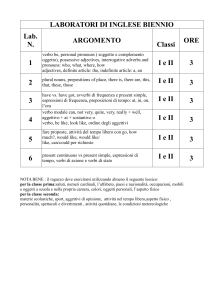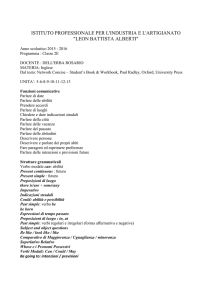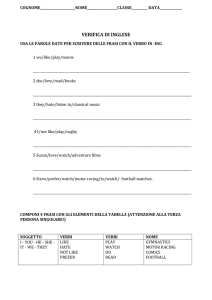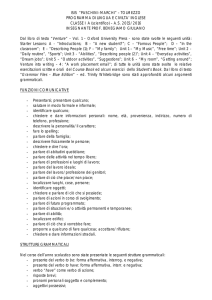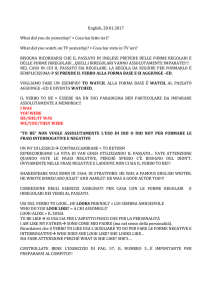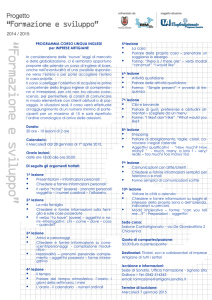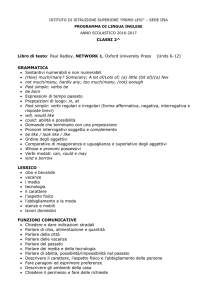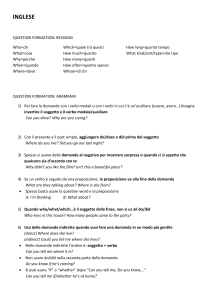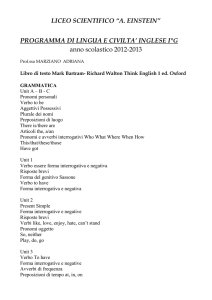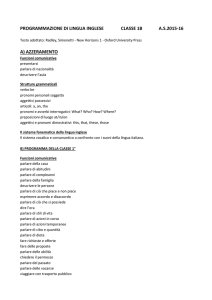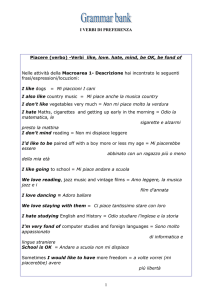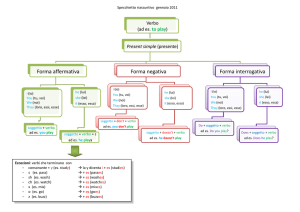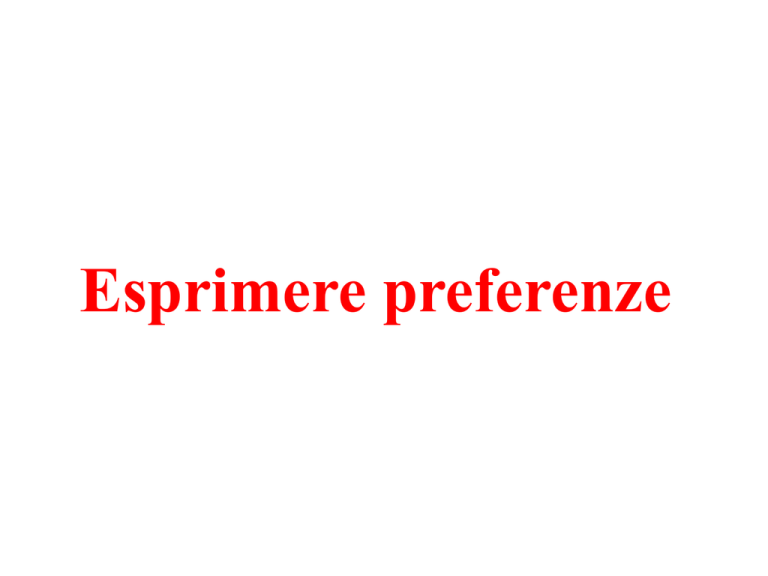
Esprimere preferenze
Per dire cosa piace o non piace
LIKE
LOVE
HATE
PREFER
CAN’T BEAR
CAN’T STAND
ENJOY
DISLIKE
DETEST
DON’T MIND
+ sostantivo
TO + INFINITO
VERBO IN –ING
I like rock music
I like to get up early (tipico dell’inglese americano)
o
I like getting up early (tipico dell’inglese britannico)
In inglese britannico si tende ad usare la forma in –ing per ciò che
effettivamente dà piacere e la forma to + infinito per abitudini e scelte
I like to eat a lot of vegetables
I like to go to the dentist twice a year
Mi piace (= è mia abitudine, penso che sia una cosa saggia)
I like going to the dentist = Mi diverto ad andare dal dentista!!!
I like to clean the kitchen as often as possibile = Mi piace (= trovo giusto)
VERBO IN –ING I enjoy being alone = Mi piace stare da solo
pulire la cucina appena possibile
I don’t mind waiting = non mi importa aspettare
Per esprimere una preferenza, fare inviti e offerte
I WOULD LIKE / I‘D LIKE
+ sostantivo
Would you like some coffee?
+ TO + INFINITO
I would like to play tennis today =
Vorrei giocare a tennis oggi
Would you like to have lunch with me? =
Vorresti pranzare con me?
What does John like?
He likes books
What does John like doing?
What would you like?
He likes dancing
LIKE + VERBO IN ING
He likes to dance
LIKE + TO INFINITO
I’d like an apple
Would you like to dance? I'd like to
What’s John like?
LIKE + OGGETTO
WOULD LIKE + OGGETTO
WOULD LIKE + TO INFINITO
He’s really nice, intelligent and good-looking
He is like his father: they’re very sociable
-> What is the weather like?
What does John look like?
Verbo BE LIKE
It’s sunny and warm
He’s tall and slim
Verbo LOOK LIKE
Who does John look like? He looks like his mother: they’ve both got red hair
Sono verbi di stato
Non si usano al present continuous
Invece
Può essere usato anche al present continuous
Do you enjoy sport? Yes, I do
Are you enjoying this film? Yes, I am
What do you like?
What do you like doing in your free time?
I’m mad about ...
I’m crazy about ...
Vado pazzo per
I’m mad about football
I’m (very) fond of...
I’m (very) keen on…
I’m (very) into....
Sono appassionato di
I’m very fond of painting
He’s very keen on drawing
He's really into skateboarding
I
I
I
I
Mi piace molto...
enjoy...
like.... a lot
like....very much
really like...
Nome
Attenzione:
It’s good /great fun = è divertente
It’s funny = è buffo, fa ridere, è strano
I like ...
Mi piace
I prefer... to....
Preferisco.. rispetto a
o
I quite like ...
Mi piace abbastanza
I don’t mind...
Non mi dispiace
-ing
I don’t like..
I dislike...
Non sopporto
I hate...
I detest...
Odio /detesto
My favourites are…
My favourite....is..
Nome
I don’t mind waiting
(più forte e usato sopr. nello scritto)
I can’t stand...
I can’t bear...
My hobby is ...
I prefer rap music to hip hop
Il mio hobby è ...
o
I miei preferiti sono..
ing
Il mio …preferito è..
My hobby is listening to music
My favourite subject is English
Esprimere abilità
Can
= posso, so, sono capace di
FORMA AFFERMATIVA
SOGGETTO
CAN
VERBO ALLA FORMA
BASE
FORMA
INTERROGATIVA:
CAN
+
SOGGETTO
+
VERBO ALLA FORMA
BASE
FORMA NEGATIVA:
SOGGETTO
+
CAN’T
+
VERBO ALLA FORMA
BASE
Affermativa
Negativa
Interrogativa?
Risposte brevi
Affermativa
Negativa
I can play
I can’t play
Can I play ..?
Yes, you can
No, you can’t
You can play
You can’t play
Can you play ..?
Yes, I can
No, I can’t
He can play
He can’t play
Can he play ..?
Yes, he can
No, he can’t
She can play
She can’t t play
Can she play ..?
Yes, she can
No, she can’t
It can play
It can’t play
Can it play ..?
Yes, it can
No, it can’t
We can play
We can’t play
Can we play ..?
Yes, you can
No, you can’t
You can play
You can’t play
Can you play ..?
Yes, we can
No, we can’t
They can play
They can’t play
Can they play ..?
Yes, they can
No, they can’t
What are you good at?
I’m good at ..
I’m bad at ...
I’m hopeless at...
I’m useless at ...
I can ski
nome
o
-ing
Sono bravo a ..
Non sono bravo a ..
I’m good at playing football
Sono negato per
Really well
(benissimo)
I can ski really well
Very well
(molto bene)
I can swim very well
Well
(bene)
I can play the piano well
Quite well
(abbastanza bene)
I can sing quite well
Not very well
(non molto bene)
I can’t speak Spanish very well
Not at all
(per niente)
I can’t sing at all
The things I like, the things I don’t like and my hobbies
(write at least 150 words)
What do you like? What don’t you like? What are you good at? What are you bad at?
How do you spend your free time? What are your hobbies and your passions? Do you
collect (=collezionare) anything?
Do you like sport? Do you practise any sports? How often? Do you like music? What kind
of music do you listen to?
Do you like technology? What’s your favourite technological object? Why do you like it?
AT HOME
Have a nap
have a rest
I listen to music
I play the guitar/the piano
I have guitar lessons
I watch my favourite TV
programmes
TECHNOLOGY
I text my friends
I surf the Internet
I play games on my
computer
I play computer games
GOING OUT
SPORT
I meet/see my friends
I play basketball/football ecc.
I go out with my friends
I go to the swimming pool
I go to the cinema/to the disco
I practise swimming
hang around /out with my friends I go to my modern dance/karate class
go bike riding
I have dance lessons
I go for a bike ride
I go to the gym to keep fit
I go on a bike ride
I go out on my bike/ moped
I go walking/ for a walk
I go for a game of ...
I go into town
I do weight-lifting
I practise a sport at a competitive level
Parish Community Centre
/Parish Youth Club
To have football training
I do two hours’ training every evening
Do football training once a week
a volunteer youth worker
RICORDA: la forma in ING del verbo (gerundio) in inglese si usa in molti casi. Fino ad ora hai visto i seguenti:
Nel PRESENT CONTINUOUS
Affermativa
SOGG + verbo BE + verbo in ing
Negativa
SOGG + verbo BE +NOT + verbo in ing
Dopo alcuni verbi, come i VERBI DI PREFERENZA:
LIKE, LOVE, PREFER, HATE, ENJOY, DISLIKE, DETEST,
CAN’T STAND, DON’T MIND + verbo in ING
I like cooking
(il verbo di preferenza invece non va mai al present continuous)
Dopo una PREPOSIZIONE:
Quindi si usa nelle espressioni:
I am good at playing the guitar
I’m bad at dancing
Are you interested in coming to the cinema?
Ma anche tutte le volte che in italiano ho una preposizione seguita da un
verbo all’infinito:
be tired of ...
be afraid of…
After eating = dopo aver mangiato
Before eating = prima di mangiare
Come verbo sostantivato che può essere il soggetto di una frase
(in italiano ho un infinito):
Smoking is dangerous for your health = fumare è dannoso per la salute
Interrogativa
verbo BE + SOGG + verbo in ing
VARIAZIONI ORTOGRAFICHE
Se il verbo termina
con:
-e
-y
Una sola consonante
preceduta
da una sola vocale
Si elimina
Arrive -> arriving
Nessuna variazione
Study -> studying
Raddoppia la consonante
- se il verbo è di una sola stop -> stopping
sillaba
Raddoppia la consonante
refér -> referring
- se il verbo è di due
ma
sillabe e la seconda è
énter -> entering
accentata
Raddoppia la “l”
travel -> travelling
- la consonante finale è
“l”

